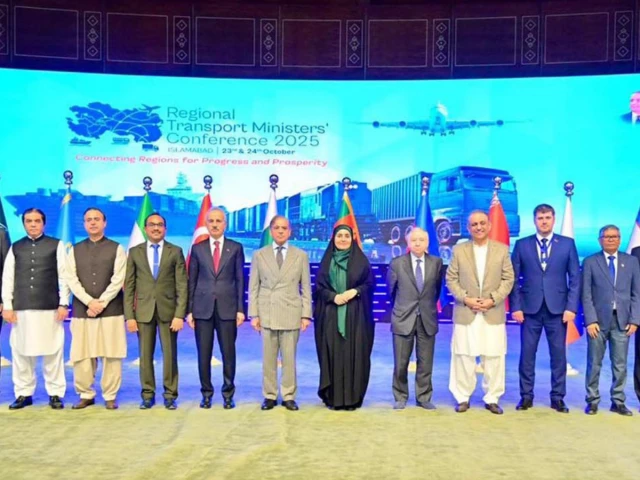Premier says Pakistan is unique tri-hub of economic corridors linking China, Central Asia and Middle East
Prime Minister Muhammad Shehbaz Sharif poses for a group photo with world leaders during the Regional Transport Ministers’ Conference held in Islamabad on Friday, October 24, 2025. Photo: APP
Prime Minister Shehbaz Sharif has said Pakistan stands as a “unique tri-hub” of economic corridors linking China, Central Asia and the wider Middle East, serving as a vital link between markets and people while opening new avenues for trade and energy cooperation.
Addressing the concluding session of the two-day Regional Transport Ministers’ Conference – themed “Regional Connectivity: Opportunities for the Region” – the Prime Minister emphasized Pakistan’s central geographical and economic role in regional integration.
The event, hosted by the Ministry of Communications, brought together transport ministers and delegates from 20 countries, along with representatives of the Asian Development Bank (ADB), the Economic Cooperation Organization (ECO) and the International Road Transport Union (IRTU).
“This would strengthen our common interest in peace and strengthen efforts for development in the region,” Shehbaz said. “Together let’s sow the seeds of cooperation so that we can reap the fruits of development and prosperity for our people, our region and beyond.”
Read more: PM calls for Qatari investment under SIFC, praises Doha’s role in Pakistan-Afghanistan ceasefire
Highlighting the importance of CPEC and other transnational rail and road initiatives, the Prime Minister said these connectivity projects would help synergize regional economies and usher in a new era of enhanced trade, economic and energy cooperation.
“For centuries, present-day Pakistan has thrived on connectivity – from the ancient Silk Road to today’s Belt and Road Initiative,” he noted. “Changing geopolitical dynamics and the growing dominance of economic priorities have breathed new life into this ancient corridor, transforming it from a relic of the past into a strategic imperative for our future.”
Prime Minister Shehbaz said Pakistan’s geography, connecting the warm waters of the Arabian Sea and the Persian Gulf, placed it at the confluence of China, the Eurasian land bridge and the Middle East. He said the country’s long coastline made the ports of Gwadar and Karachi important transit points on the Maritime Silk Road.
Praising his brother and former prime minister Nawaz Sharif’s vision, the prime minister said the signing of the China-Pakistan Economic Corridor had been a transformative step that linked markets across China, Central Asia, South Asia and the Middle East.
Also read: SP among three martyred in Hangu blasts as police kill two terrorists in operation
He said Pakistan is now entering an “exciting” new phase of CPEC 2.0 with a focus on promoting business-to-business partnerships, attracting Chinese investment and deepening mutual prosperity.
In addition, the Prime Minister mentioned several ongoing railway projects, including the Trans-Afghan Railway and the Islamabad-Tehran-Istanbul corridor, as well as plans to improve air connectivity with Central Asian states under frameworks such as the TIR Convention.
Calling connectivity “not just about roads and railways,” he said, Pakistan was also investing in digital infrastructure to prepare for the fourth industrial revolution. “We may not have black gold, but our youth – 60% of whom are between the ages of 15 and 30 – are our biggest asset,” he noted.
In his closing remarks, Communications Minister Abdul Aleem Khan said the participants had reaffirmed their commitment to strengthening connectivity as a path to shared prosperity. He said the conference emphasized creating new linkages, developing innovative financing mechanisms and fostering partnerships with international financial institutions.
The participants, he added, also called for liberal visa regimes, improved road safety measures and stronger cooperation to achieve sustainable regional growth.



